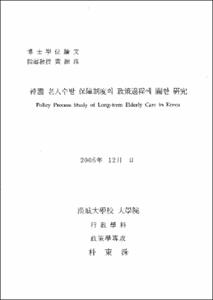한국 노인수발 보장제도의 정책과정에 관한 연구
- Files in This Item:
-
-
Download
 000000557021.pdf
기타 데이터 / 10.86 MB / Adobe PDF
000000557021.pdf
기타 데이터 / 10.86 MB / Adobe PDF
-
Items in Repository are protected by copyright, with all rights reserved, unless otherwise indicated.
 000000557021.pdf
기타 데이터 / 10.86 MB / Adobe PDF
000000557021.pdf
기타 데이터 / 10.86 MB / Adobe PDFItems in Repository are protected by copyright, with all rights reserved, unless otherwise indicated.